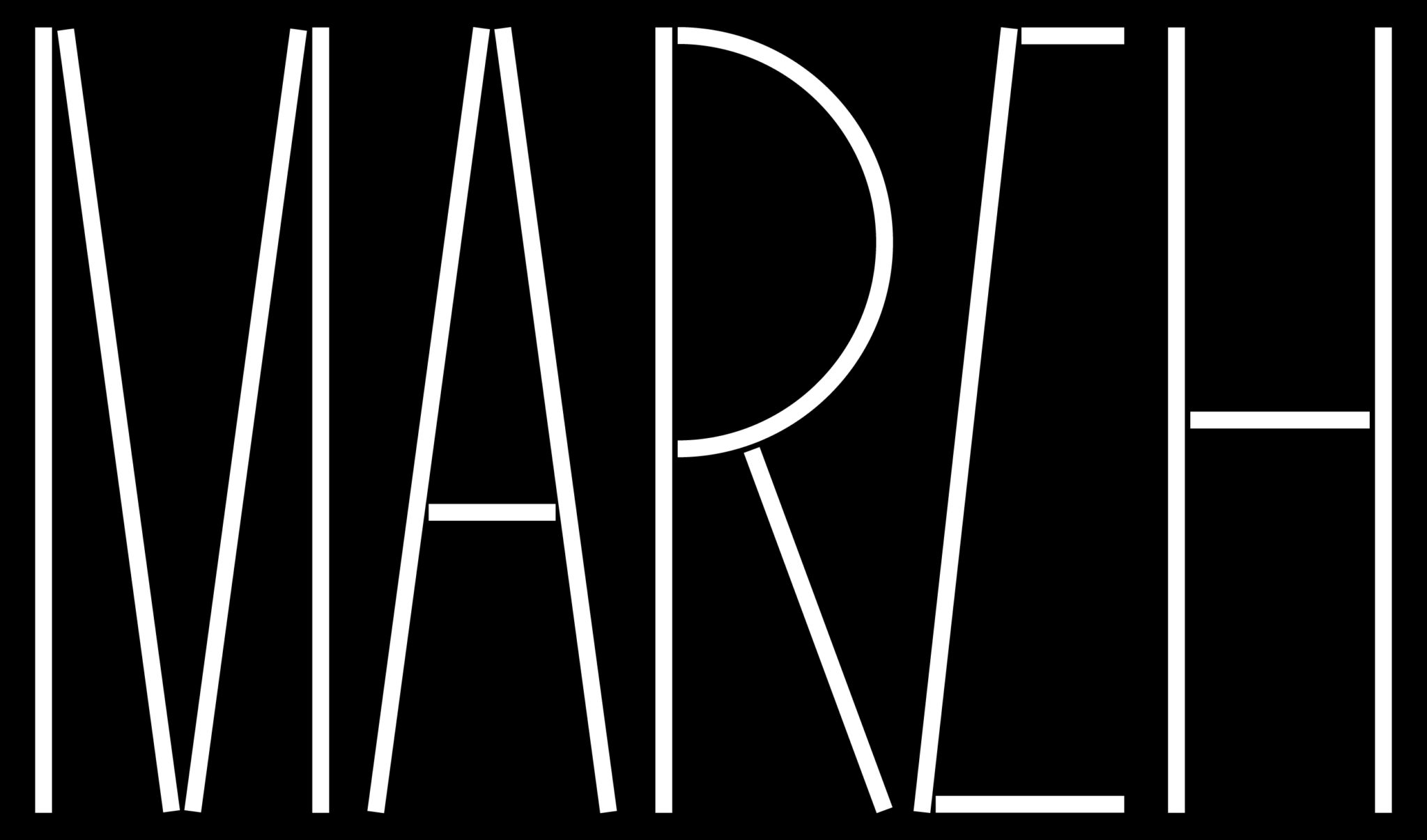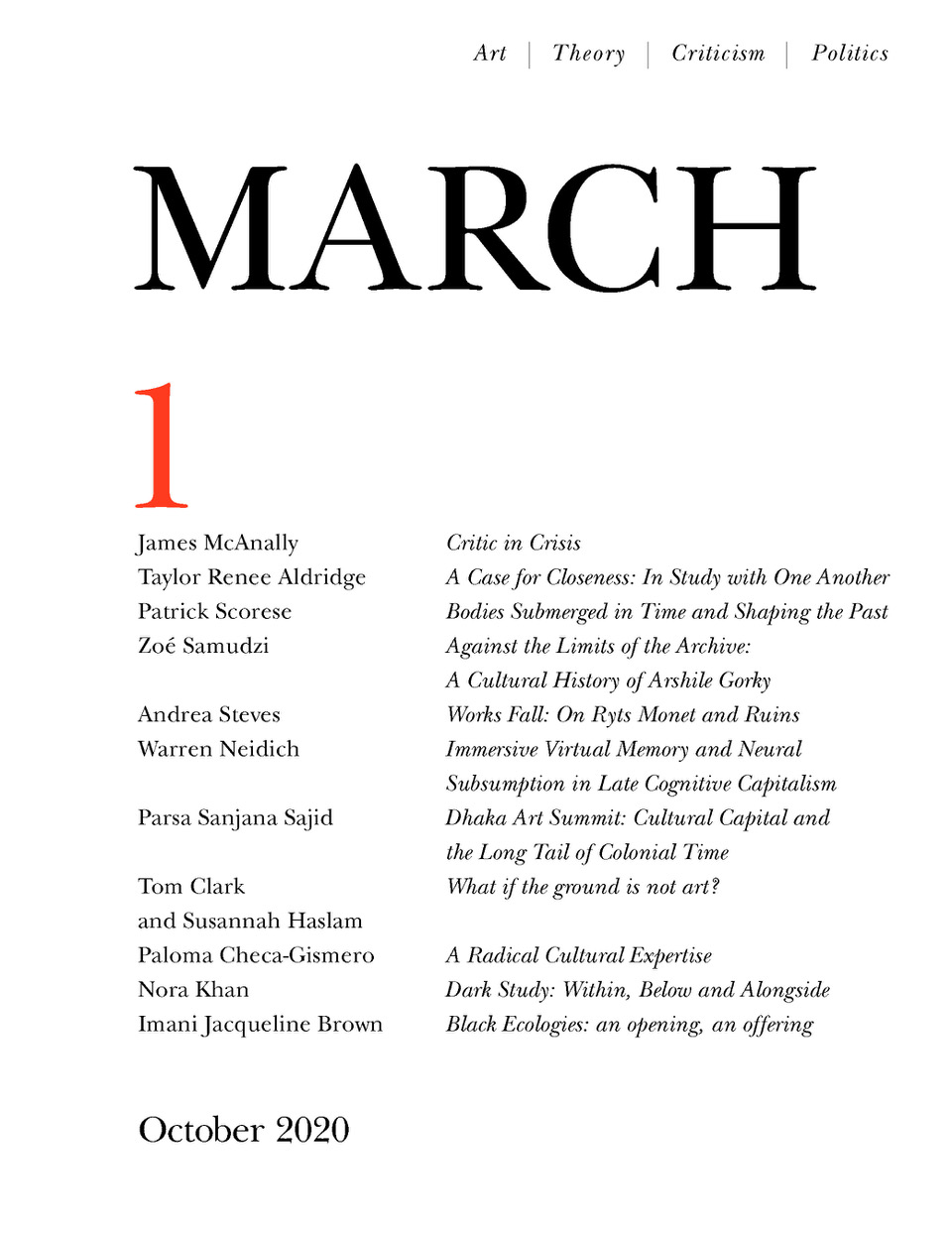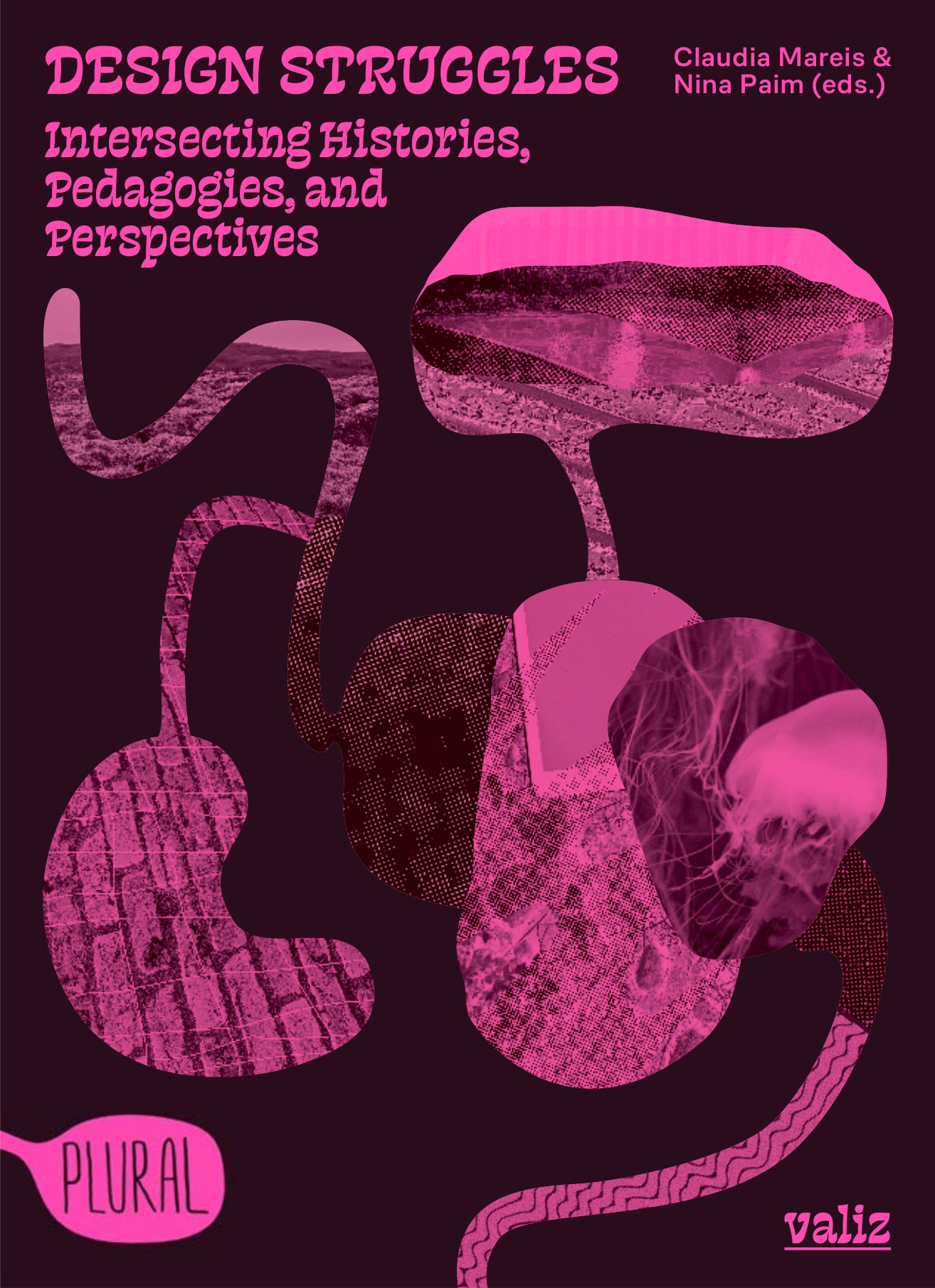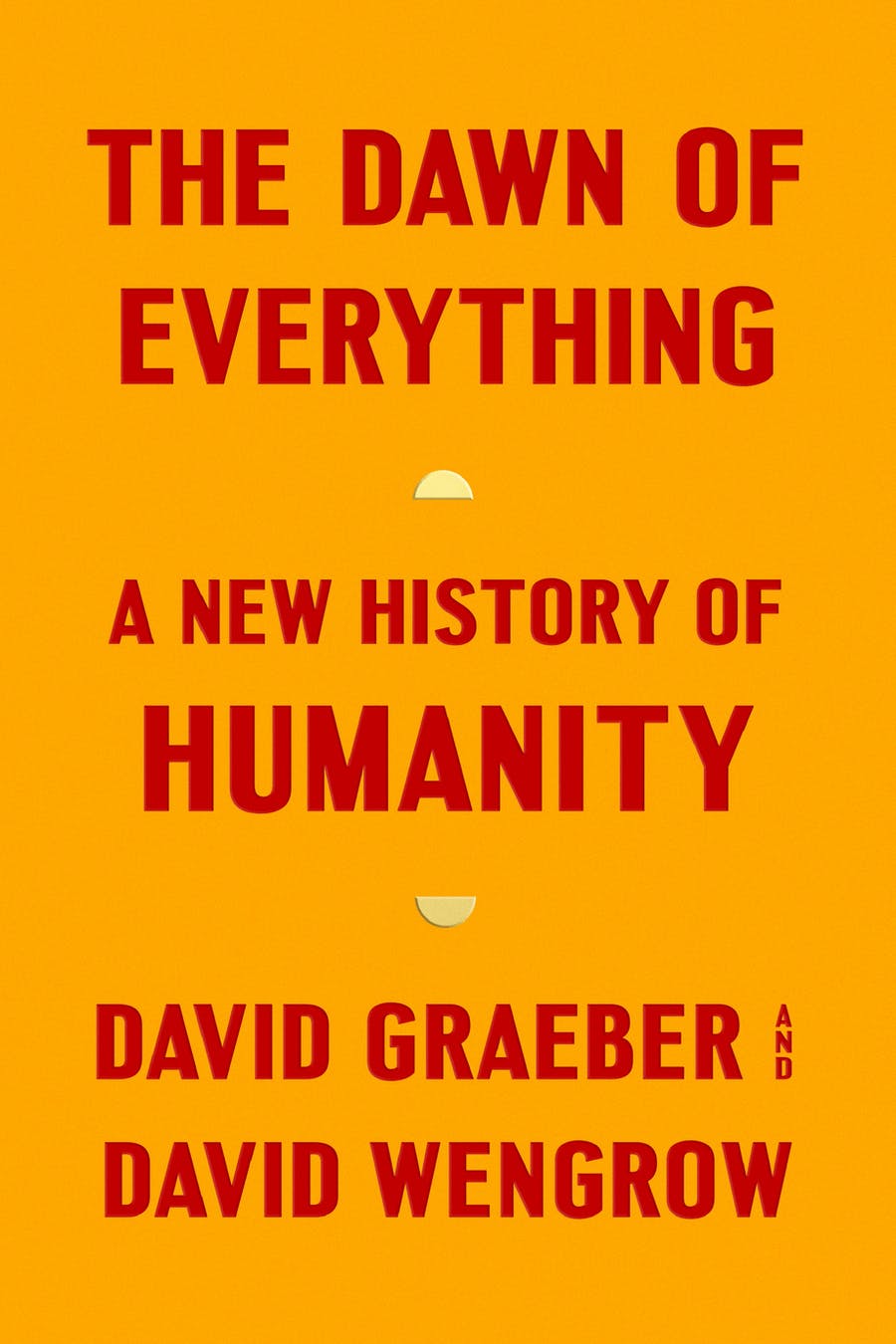MARCH, journal of art and strategy (2020–)
Filed under journal | Tags: · activism, art, black people, critique, politics, protest, publishing, sound


“MARCH embraces publishing as an act of protest to address the critical social and political issues of our time. MARCH emerges at a moment of deepening institutional crisis and is intent on advancing new forms of publication, critique, and public action. We are a partisan publication: we initiate, articulate, advance, and defend prefigurative ideas about what art is, could and should be. We believe in the latent potential critique carries to transform our art worlds, our institutions, our means of expression and experimentation, and ourselves. We are con-temporary, with and in our time—an archive of the present and proposition towards the future—where our ideas, actions and form embodies this insurrection.
MARCH features an annual print edition alongside an active online platform commissioning essays, interviews, and experimental critical writing with a global perspective. ”
Edited by Sarrita Hunn, James McAnally, et al.
Interview with editors: Mela Dávila Freire (A*Desk, 2021, EN/ES/CA).
Issues, features:
Dispatches (2020)
Issue 1 (2020-2021)
Issue 2: Black Ecologies (ed. Imani Jacqueline Brown, 2021-2022)
Publishing as Protocol (eds. with Constant and Vessel, 2021-2023)
Conversations on Sound and Power (ed. Sonic Insurgency Research Group, 2021-2022)
Multidirectional Memory (2022-)
Claudia Mareis, Nina Paim (eds.): Design Struggles: Intersecting Histories, Pedagogies, and Perspectives (2021)
Filed under book | Tags: · critique, decoloniality, design, design history, design research, feminism, graphic design, pedagogy, postcolonialism, precarity

“Design Struggles critically assesses the ways in which the design field is involved in creating, perpetuating, promoting and reinforcing injustice and inequality in social, political, economic, cultural and ecological systems. This book shows how this entanglement arose from Eurocentric and neoliberal thinking. The voices and practices represented here propose to question and disrupt the discipline of design from within, by problematizing the very notions of design. They aim to do so by generating new, anti-racist, post-capitalist, queer-feminist, environmentally conscious and community-based ideas on how to transform it. In this way, Design Struggles strives to forge sustainable, new practices that challenge the status quo and amplify underrepresented voices, both in the world of design, as well as beyond.
In order to reimagine design as an unbound, ambiguous, and unfinished practice, this publication gathers a diverse array of perspectives, ranging from social and cultural theory, design history, design activism, sociology, anthropology, critical and political studies, with a focus on looking at design through the intersections of gender, race, ethnicity, culture, class, and beyond. The book combines the latest comprehensive insights (rooted in design practices) with engaging and accessible storytelling. In doing so, Design Struggles brings together an urgent and expansive array of voices and views, representing those engaged in struggles with, against or around design.”
Contributors: Danah Abdulla, Tanveer Ahmed, Zoy Anastassakis, Ahmed Ansari, Brave New Alps, Johannes Bruder, Cheryl Buckley, Sria Chatterjee, Alison J. Clarke, Sasha Costanza-Chock, Paola De Martin, Decolonising Design, depatriarchise design, Bianca Elzenbaumer, Arturo Escobar, Kjetil Fallan, Griselda Flesler, Corin Gisel, Matthew Kiem, Claudia Mareis, Ramia Mazé, Tania Messell, Anja Neidhardt, Nan O’Sullivan, Maya Ober, Nina Paim, Luiza Prado de O. Martins, Mia Charlene White.
Publisher Valiz, Amsterdam, May 2021
Plural series, 3
Creative Commons BY-NC-ND 3.0 License
ISBN 9789492095886, 9492095882
411 pages
Review: Saraleah Fordyce (Design and Culture, 2021).
Comment (0)David Graeber, David Wengrow: The Dawn of Everything: A New History of Humanity (2021)
Filed under book | Tags: · agriculture, bureaucracy, city, critique, history, human, indigenous peoples, politics, production, progress, property, sovereignty

“For generations, our remote ancestors have been cast as primitive and childlike–either free and equal innocents, or thuggish and warlike. Civilization, we are told, could be achieved only by sacrificing those original freedoms or, alternatively, by taming our baser instincts. David Graeber and David Wengrow show how such theories first emerged in the eighteenth century as a conservative reaction to powerful critiques of European society posed by Indigenous observers and intellectuals. Revisiting this encounter has startling implications for how we make sense of human history today, including the origins of farming, property, cities, democracy, slavery, and civilization itself.
Drawing on research in archaeology and anthropology, the authors show how history becomes a far more interesting place once we learn to throw off our conceptual shackles and perceive what’s really there. If humans did not spend 95 percent of their evolutionary past in tiny bands of hunter-gatherers, what were they doing all that time? If agriculture, and cities, did not mean a plunge into hierarchy and domination, then what kinds of social and economic organization did they lead to? The answers are often unexpected, and suggest that the course of human history may be less set in stone, and more full of playful, hopeful possibilities, than we tend to assume.”
Publisher Farrar, Straus and Giroux, November 2021
ISBN 9780374157357, 0374157359
xii+692 pages
Reviews: William Deresiewicz (The Atlantic, 2021), Giulio Ongaro (Jacobin/Tribune, 2021), Jennifer Schuessler (The New York Times, 2021), Kwame Anthony Appiah (The New York Review, 2021), David Priestland (The Guardian, 2021), Emily Kern (Boston Review, 2021), Steve Rushton (Bella Caledonia, 2021), George Scialabba (New Republic, 2021), Chris Knight, Nancy Lindisfarne and Jonathan Neale (Monthly Review, 2021), Tunku Varadarajan (Wall Street Journal, 2021), Erle C. Ellis (Science, 2021), Peter Isackson (Fair Observer, 2021), Noah Berlatsky (NBC News, 2021), Annalee Newitz (Washington Post, 2021), Matthew Porges (LA Review of Books, 2022), Richard Handler (TLS, 2022), anon. (Astral Codex Ten, 2022), Milena Bartlová (A2larm, 2022, CZ), Joe Gill (Middle East Eye, 2023), Jan Bělíček, Eva Klíčová (Alarm, podcast, 2024, CZ), more.
Book website
Publisher
WorldCat

